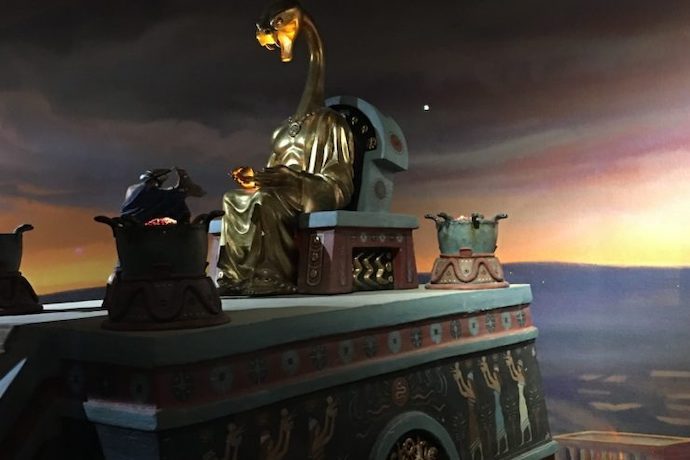Dinos and Demons and Swedes, oh my! In the span of just a few days last week, American evangelicals made headlines for lying about who discovered some dinosaur bones they stole; for telling inspiring teenage activist Greta Thunberg to read the book of Genesis and stop worrying about climate change; and for accusing Democrats of worshiping “the demon god Moloch.”
The man behind the latter two stories, Pastor Robert Jeffress of 13,000-member megachurch, First Baptist Dallas, was also in the news for threatening the possibility of civil war (though he now denies that’s what he meant). Of course, the more flamboyant Christian Right leaders have a pattern of stochastic terrorism, just like the (arguably illegitimate) president they’ve rallied around who amplified Jeffress’s barely veiled threat via Twitter.
Stochastic terrorism may seem to be a far more serious matter than the first three cartoonish behaviors mentioned above, but they all stem from the same authoritarian ethos and ideology shared among the vast majority of America’s white evangelicals. Evangelical authoritarianism is a problem that the American mainstream as a rule fails to treat with the seriousness it demands, in part because it’s easy to laugh at the antics of a Robert Jeffress while assuming that conservative evangelicals who cultivate a more respectable image are not only genuinely less theocratically oriented, but also more representative. Both assumptions are highly dubious.
The fact remains that the vast majority of white evangelicals support Trump because he validates their fears and vigorously pursues their agenda. The paradox has been noted before—Trump supporters see the president as a controversial truth-teller, as “telling it like it is” when he says false and offensive things, even though Trump has made an unprecedented number of false or misleading statements during his tenure of less than three years in office—over 10,000 of them, according to The Washington Post. Authoritarians have a very different relationship to the truth than the rest of us, so when Trump claims he had the largest inauguration crowd in history, or Jeffress spouts the absurd lie that Democrats worship an ancient Mesopotamian deity associated with child sacrifice, around 8 in 10 white evangelicals—using the percentage of white evangelical voters who voted for Trump as a rough approximation—will assent to, or at best excuse, the claims.
In authoritarian communities like the white evangelical one I grew up in, certain sacrosanct “Truths” become markers of in-group identity. Members of these communities build up infrastructure—in this case Christian publishing houses, bookstores, alternative cultural products, Christian schools and curricula, etc.—in order to generate pseudo-intellectual justifications for, and defenses of, their reality-challenged views. Institutionalized fundamentalist Christian anti-intellectualism, whether evangelical or otherwise, has helped pave the way for the breakdown of the American public sphere into its current post-truth state, in which “alternative facts” are treated as though they deserve as much of a hearing as, well, actual, demonstrable facts, all to the detriment of democracy.
The recent headlines about evangelical absurdities illustrate this nicely. If not for the questions The New Yorker’s exposé raises about apparent congressional ethics violations by North Carolina Representative Mark Meadows, former chair of the far-right Freedom Caucus, it’s unclear how newsworthy many journalists would consider the events surrounding the discovery of an Allosaurus skeleton used in a dishonest “documentary” that then ended up as a star attraction at The Creation Museum (where the dead dino is affectionately known as “Ebenezer”). The deception and backstabbing by evangelicals of their own coreligionists is an important part of the story too, however, though most of that, including details not covered in The New Yorker, was laid out five years ago by ex-evangelical children’s rights advocate and survivor of evangelical homeschooling, Ryan Stollar. The sordid details illustrate the ways in which abuse and hypocrisy are baked into authoritarianism.
More concerning for the wider public is the evidence that Meadows and Montana Representative Greg Gianforte appear to support the anti-science ideology of young-Earth creationism—and they are surely not the only members of Congress who do. Even if 40% of U.S. adults hold to the same view, we should be alarmed if not surprised at its influence in government, where policy should be based on facts. All of which brings us back to both the homeschooling connection and The Creation Museum.
In her book, Building God’s Kingdom: Inside the World of Christian Reconstruction, University of North Florida Professor of Religious Studies Julie Ingersoll has thoroughly documented how homeschooling and Christian school curricula have been effectively used to radicalize evangelical subculture, mainstreaming authoritarian and anti-science views. I happened to have the opportunity to tour both The Creation Museum and Ark Encounter—the two major attractions owned and operated by Answers in Genesis—with Dr. Ingersoll and another friend this past May.
Built and maintained by Ken Ham’s ministry, Answers in Genesis, The Creation Museum and Ark Encounter are, together, the large-scale physical embodiment of an evangelical approach to apologetics, or defense of the faith. Specifically, they embody a radical epistemology that literary scholar Christopher Douglas, a professor at the University of Victoria, calls “Christian postmodernism,” but which Christian Reconstructionists themselves call presuppositionalism. The general idea is that we all have “worldviews” that generate consistent logic on the basis of certain assumptions, or presuppositions, and that when two people with different worldviews look at the same evidence, their presuppositions will lead them to very different conclusions.
Where this epistemological approach becomes truly radical is in its insistence not only that there is no possibility for adjudicating between competing worldviews using human reason, but that our safest bet is to rely on the Holy Spirit and an essentially literal reading of the Bible for our understanding of truth. Christian presuppositionalists also argue that there can be no neutrality among competing worldviews, which is what allows them to so casually denounce points of view to which they are ideologically opposed, like environmentalism, as another “religion.” And they are quite explicit about seeking “dominion,” a term used on installations in The Creation Museum and Ark Encounter, for adherents of their own worldview.
Not far from the entrance to The Creation Museum, one encounters a series of pseudoscientific posters creating false equivalence between the scientific consensus and the views of young-Earth creationists along the lines of “Some scientists think X, but creationists know Y to be true.” The museum’s emphasis then shifts rapidly to one of moral consequentialism, pressing upon visitors the notion that godlessness leads to horrific destruction, as in the “Cave of Sorrows” exhibit. Many subsequent exhibits, including the one featuring “Ebenezer” the dinosaur, include pseudoscientific language that evangelicals and fundamentalists insist is every bit as scientific as actual science, since it all supposedly comes down to presuppositions and incompatible worldviews. But heavy-handed preaching also continues throughout, as it does at Ark Encounter.
Recently, while discussing the spring visit, Ingersoll mused:
“I found Ark Encounter in particular disturbing. It was such an effective presentation of an interpretation of the Bible that it left visitors unaware of how much was ‘interpretation.’ A woman standing next to me at one of the depictions of human accommodations aboard the ark exclaimed, ‘Wow! I didn’t know they had stoves!’”
She then offered the following summation:
“While it might seem that ‘creationism’ is an effort to promote an alternative ‘science,’ it is in fact rooted in evangelical apologetics and epistemology. It’s the linchpin of evangelicals’ presuppositionalism, which argues that there can be only one source of knowledge: God’s revealed word. All other claims to knowledge (other religions, science, philosophy, even history not grounded in the Bible) is false as it is based in original sin, the worship of a ‘false god,’ the claim that human reason can function autonomously.”
And that notion of “worship of a false god” allows us to tie Jeffress’s comments on Democrats’ supposed worship of Moloch to Ark Encounter. Specifically, in its representation of “the pre-flood world,” an Ark Encounter diorama depicts humans bringing sacrifices, including live infants, to the ancient deity (portrayed as a golden idol with the head of a snake as a not so subtle hint that other “gods” are ostensibly “demonic”), an echo of Jeffress’s “demon god” comment. What Jeffress made explicit—the connection in evangelicals’ minds between ancient child sacrifice and abortion today—is only alluded to in Ark Encounter’s depiction of Moloch. For those who don’t value subtlety, both Ark Encounter and The Creation Museum do not shy away from directly portraying abortion as evil in other exhibits.
Why should the American mainstream be concerned about such outlandish expressions of fundamentalist Christianity, from which conservative, mostly white evangelicalism has become largely indistinguishable? Well, Jeffress, one of Trump’s most loyal evangelical toadies, has the ear of the man occupying the oval office. And white evangelicals, like the typical visitor to The Creation Museum and Ark Encounter, are more numerous, and vote in greater proportion than, many other demographics. And finally, on the question of whether we can dismiss evangelicals like Jeffress and Ken Ham as “fringe,” it’s worth noting that the Green family, best known as the founders of Hobby Lobby and the Museum of the Bible—which represents itself as a much more respectable and supposedly authentically scholarly endeavor than The Creation Museum and Ark Encounter—have loaned some of their exhibits for display in both of Answers in Genesis’s extremist attractions.
With “respectable” evangelicals already launching attempts to whitewash evangelicalism in the run-up to the 2020 election, we need to be mindful of such connections. If we fail to take a long, hard look at evangelical radicalization and its consequences, our chances of putting the United States onto a healthy democratic path are slim to none.





